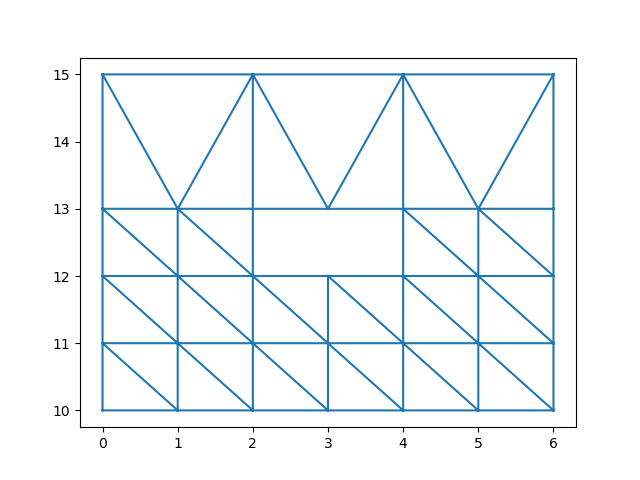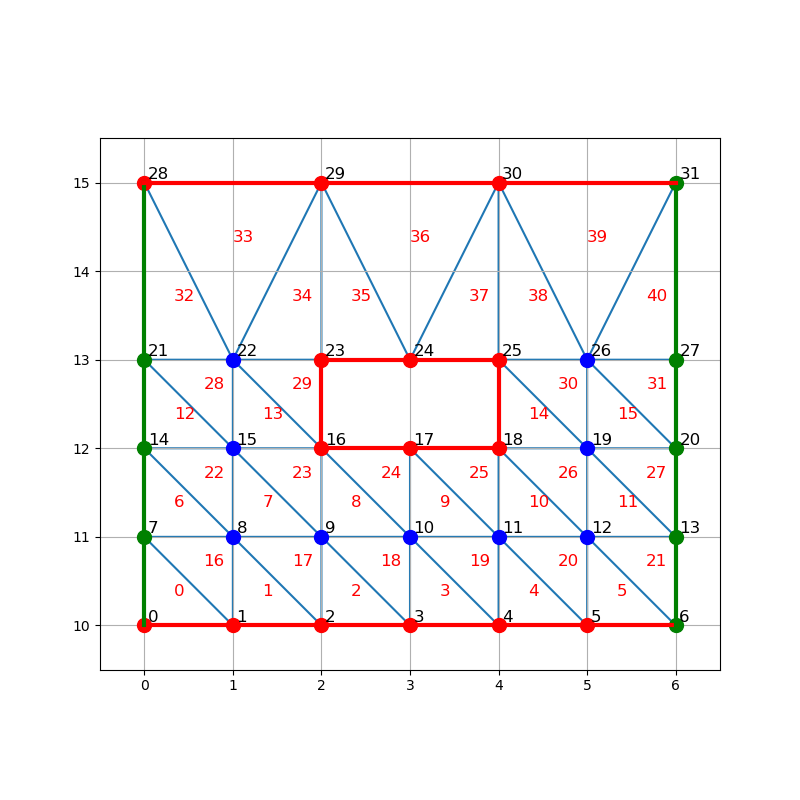Note
Click here to download the full example code
Construct a Mesh from a .msh file¶
Mesh is constructed from a .msh and plotted.
import matplotlib.pyplot as plt
import numpy as np
import freshkiss3d as fk
import freshkiss3d.extra.plots as fk_plt
Read a Mesh¶
There is two ways to visualize a mesh from a file. You can either build a TriangularMesh or directly use the read_msh function.
TG, vertex_labels, boundary_labels = fk.read_msh('inputs/tiny.msh')
Warning
The read_msh function is compatible with .msh, .msh (GMSH) and .mesh
(MEDIT) formats ONLY. Note that the .msh used in freshkiss3d isn’t the
same as gmsh .msh format.
Construct a TriangularMesh¶
triangular_mesh = fk.TriangularMesh.from_msh_file('inputs/tiny.msh')
TG = triangular_mesh.triangulation
vertex_labels = triangular_mesh.vertex_labels
boundary_edges = triangular_mesh.boundary_edges
Note
When you build a TriangularMesh, the read_msh function is called in the background
Basic plot¶
To visualize the mesh with triplot you need to recover nodes coordonates (x,y) and triangles (trivtx)
x = np.asarray(TG.x)
y = np.asarray(TG.y)
trivtx = np.asarray(TG.trivtx)
plt.triplot(x, y, trivtx)
plt.show()

Fancy plot¶
Basic plot isn’t really helpfull when you need specific information about your mesh, for example node or boundary labels. So here is shown how to add life to your mesh plots:
colors = {0:'blue', 1:'red', 2:'green'}
plt.figure(figsize=(8, 8))
# Plot triangles.
plt.triplot(x, y, trivtx)
xtri = np.average(x[trivtx], axis=1)
ytri = np.average(y[trivtx], axis=1)
fk_plt.put_text_index(xtri, ytri, color='red')
# Plot points.
for a, b, label in zip(x, y, vertex_labels):
plt.plot(a, b, marker='o', color=colors[label], markersize=10)
fk_plt.put_text_index(x, y, offset=(0.04, 0.04))
# Plot edges.
for B in range(boundary_edges.size):
i0 = boundary_edges.vertices[B, 0]
i1 = boundary_edges.vertices[B, 1]
x0, y0 = x[i0], y[i0]
x1, y1 = x[i1], y[i1]
plt.plot([x0, x1], [y0, y1], color=colors[boundary_edges.label[B]], linewidth=3.)
plt.grid()
plt.axis('scaled')
plt.xlim(-0.5, 6.5)
plt.ylim(9.5, 15.5)
plt.show()

Total running time of the script: ( 0 minutes 0.295 seconds)